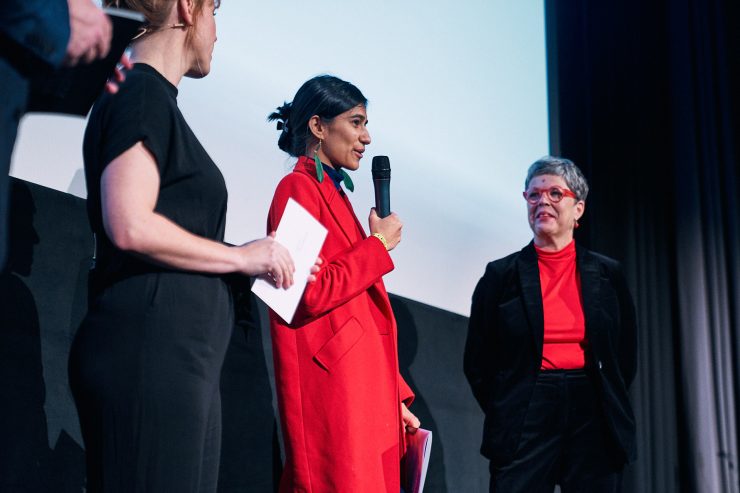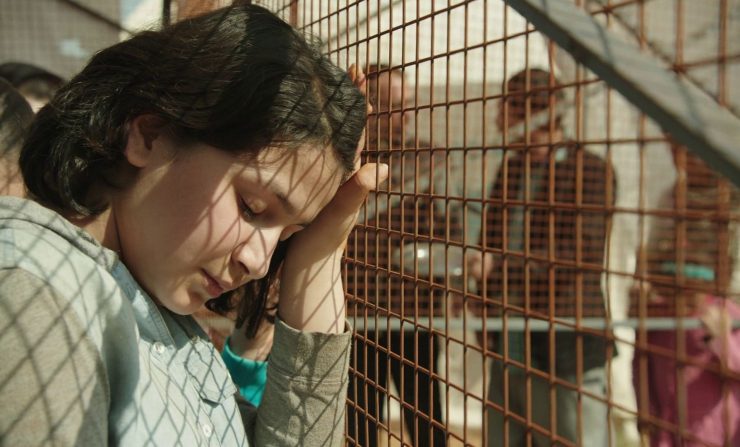Ragini Bhasin is a recent graduate of the MFA program in Film Production. Her graduate thesis film, Ghazaal, tells the story of a 13-year-old Afghan girl who hustles around in a refugee camp in Turkey to survive the harsh circumstances. When she gets her monthly period she does whatever it takes to make ends meet.
Ghazaal has screened at numerous film festivals, and most recently won the ARTE Short Film Award at FILMSCHOOLFEST Munich.
We asked Ragini to answer some questions about storytelling and the filmmaking process:
DC: You’ve screened at and won a number of awards already (e.g. South Dakota Film Festival – Winner Best  International Short Film; Calcutta International Film Festival – Winner Best Student Short Film) what makes FILMSCHOOLFEST MUNICH special?
International Short Film; Calcutta International Film Festival – Winner Best Student Short Film) what makes FILMSCHOOLFEST MUNICH special?
RB: Filmschoolfest Munich is the first festival I attended where my film was screened! The one-week-long festival was truly a magical, collective experience where all the filmmakers stayed together in the same hotel, watched all the shorts and socialized afterwards. The festival coordinators treated the filmmakers with utmost care and love. I was also interviewed for a radio channel which was a great experience.
DC: How did you decide on the story you wanted to tell in your film? What was that process and did the story change along the way?
RB: It bothers me that periods are still considered taboo in every part of the world. Making a film on that subject was the smallest step I wanted to take to normalize it in the audience’s mind and in my mind as well. Once I decided to set it in a refugee camp, I volunteered in the Moria refugee camp in Greece for a couple of weeks to get an idea of what life is like in one. The condition of these camps are so bad that many refugees said that they’d prefer going back to their home countries where the war is still going on than to stay in such pathetic conditions. Despite that, all the refugees that I met were so kind and hospitable to me and the other volunteers. They did not have access to basic amenities like cold water but shared whatever they had with us.
I changed my script a lot after volunteering at the camp and made the characters emerge as survivors and not victims.
After going back and forth, I finally got the approval to shoot the film in India. We built the refugee camp from scratch on barren land, worked with non-actors and took the help of my parents who were the best fixers. I’d recommend anyone who wants to shoot in New Delhi to work with them. I was also super lucky to have an incredible thesis crew who took on all the challenges and surpassed my expectations. They were up for any and every challenge that the production posed.

DC: What has been the most memorable part of making Ghazaal?
RB: The most memorable part of making Ghazaal was working with children. They were all non-actors so I never gave them the script. That would have freaked them out or made them feel like they had to ‘act.’ I wanted them to be themselves so I roughly told them what the film is about and did a number of improvs. They were so enthusiastic and would never get tired. I think the best scene in the entire film is the one with all the children when Ghazaal is selling the socks. I remember smiling constantly when they were ‘acting’ because they were so raw and authentic. If you love children the way I do, I’d recommend you to work with them; they bring out the best in directors.
DC: What advice do you have to students who are directing their thesis films?
RB: My biggest advice to thesis film directors is to be completely open to changing the ‘plot’ at every step, from pre-production to post-production, but try to stay completely true to the ‘story.’ The plot can keep changing but try your best to stay true to the story you want to tell.
DC: What are you looking forward to?
RB: I’m shooting a short film in January that digs deep into the psyche of a 10-year-old boy who meets his stepbrother for the first time. I am very excited to work with Tenoch Huerta who is famous for Narcos: Mexico, on this project. I am also currently developing my first feature film which revolves around a mother who is made to confront her family’s darkest secrets when her son returns home after going missing for a week. I hope to shoot that by Fall 2021.



Aucun commentaire:
Enregistrer un commentaire